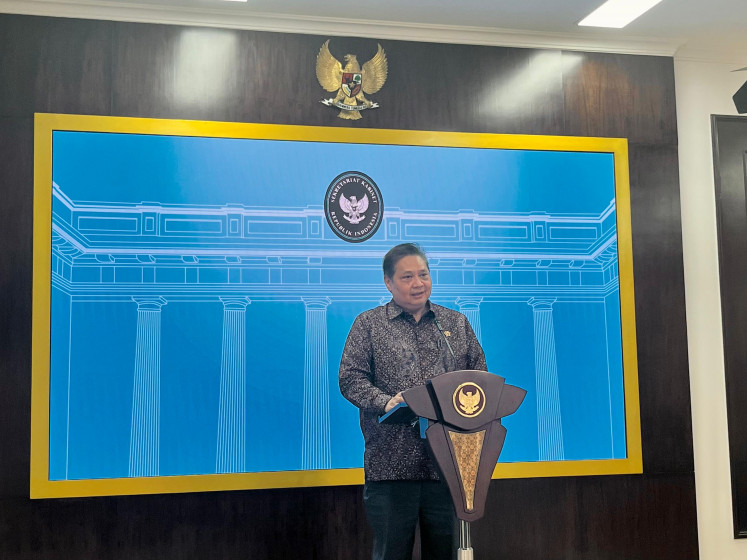Lyle F. Bachman: Helping language teachers in testing times
LYLE F
Change text size
Gift Premium Articles
to Anyone

LYLE F. BACHMAN: JP/SETIONO SUGIHARTO
In any area of importance and controversy, there is someone who steps forward to lay the groundwork and make a breakthrough. In the field of language assessment, that someone is Lyle F. Bachman.
Every year when time for the national exam comes around, a debate rages over whether the exam should be terminated. Some voice their concern about the fairness of the test results, while others see the exam as mandatory for the sake of evaluating students’ academic achievements.
Widely used international standardized language tests such as TOEFL and IELTS do not escape the controversy. Many examiners often cast doubt over the fairness of these tests when they are used worldwide, with the test takers coming from different cultures, ethnic groups and races.
Increasing concern over issues of fairness in assessment in general, and language assessment in particular, prompted Lyle F. Bachman to release his latest book (co-authored with his colleague Adrian S. Palmer): Language Assessment in Practice: Developing Language Tests and Justifying their Use in the Real World.
The book offers practical insights into what a language teacher needs to know in constructing a test and how to justify it. Issues on consequences, ethics and fairness in language assessment are also presented.
Now Professor and Chair of the Department of Applied Linguistics at the University of California, Los Angeles (UCLA), Bachman visited Indonesia at the end of January to speak at the two-day symposium on Assessment in Language Learning and Teaching, hosted by Satya Wacana University in Salatiga, Central Java.
The primary purpose of language tests, Bachman said, is not merely to gather information about the students’ language performance, but also to help teachers make decisions that will lead to beneficial consequences for all involved.
“Accountability” is the key word for teachers wishing to construct a language test.
“We need to be ready if we are held accountable for the use we make of a language test, and be prepared to convince stakeholders that the intended uses of our test are justified,” Bachman said on the sidelines of the seminar.
Having extensive experience working in foreign language contexts, Bachman is aware that constructing English language tests for multilingual students is no easy task. For this reason, he has sought to develop a framework based on an “assessment use argument”, which can help provide the rationale and justification for the decisions in designing and developing the test.
This provides a useful framework as it contains some of the qualities of the claims needed to justify our tests.
“No language tests take place in a value-free system and the test should therefore have equitability, meaningfulness, impartiality, generalizability, relevance and sufficiency.”
As an internationally respected scholar in the field of language assessment, Bachman is often invited to work and teach outside the United States.
He worked in Thailand for six years as a project specialist for the Ford Foundation, where he directed an intensive English program and conducted research into the assessment of language proficiency.
He also spent three years at Teheran University in Iran developing an ESP reading curriculum. He is now a visiting professor at the University of Hong Kong’s Faculty of Education where he is developing an English language enhancement program.
Bachman first came to Indonesia in 1979 as a consultant on language testing and language program development. He worked with Indonesian scholars at the University of Malang in East Java.
“I was invited by the Balai Bahasa [Language Center] at the University of Malang to construct language tests for Indonesian students at that time. I love working in Indonesia because there are so many things here that can be explored for research purposes,” Bachman said in an interview with The Jakarta Post.
Bachman is well known among students of applied linguistics here in Indonesia thanks to his seminal books Fundamental Considerations in Language Testing and Language Testing in Practice (with Adrian S. Palmer), which are considered by many testing specialists as a breakthrough in the field of language assessment.
Other works of his that are important for language students to know include Statistical Analyses for Language Assessment, What does Language Testing have to Offer? and Interfaces between Second Language Acquisition and Language Testing Research.
Bachman’s extensive works in language assessment have won him several prestigious awards. In 1999, Bachman was the first winner of the TESOL/Newbury House Award for Outstanding Research and won the Modern Language Association of America’s Kenneth Mildenberger Award. The International Language Testing Association presented him with a Lifetime Achievement Award in 2004.
“Much of my research now is concerned with helping teachers get an understanding of how they can provide an explicit rationale and justification for the links between assessment performance and assessment use,” Bachman said.
“We now no longer talk about issues of validity of language tests because it isn’t a practical concept and not many teachers are able to digest it. What we must do is to prepare them to be ready to justify the uses of assessment to stakeholders.”









